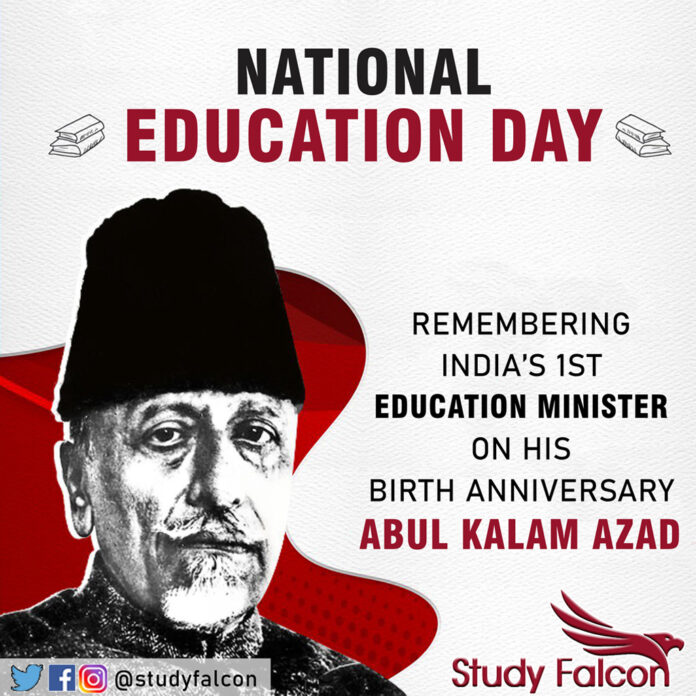Maulana Abul Kalam Azad was born on 11 November, 1888 in Mecca, Saudi Arabia. He was a leading figure in India’s struggle for freedom and a noted writer, poet and journalist. He adopted the pen name Azad (Free). In his childhood, Azad had a traditional Islamic education, along with training in subjects like mathematics, philosophy, world history and science by tutors at his home. Through his own efforts, he learnt English, along with Western philosophy, history and contemporary politics. He visited countries like Afghanistan, Iraq, Egypt, Syria and Turkey. He opposed the partition of Bengal in 1905.
Maulana Abul Kalam Azad was one of the most influential independence activists during India’s freedom struggle. He was also a noted writer, poet and journalist. He was a prominent political leader of the Indian National Congress and was elected as Congress President in 1923 and 1940. Despite being a Muslim, Azad often stood against the radicalizing policies of other prominent Muslims leaders like Muhammad Ali Jinnah. Azad was the first education minister of independent India. Maulana Abul Kalam Azad was posthumously awarded ‘Bharat Ratna’, India’s highest civilian honor, in 1992.
Azad was the son of an Indian Muslim scholar living in Mecca and his Arabic wife. The family moved back to India when he was young, and he received a traditional Islamic education at home from his father and other Islamic scholars rather than at a madrasah (Islamic school). However, he was also influenced by the emphasis that Indian educator Sir Sayyid Ahmad Khan placed on getting a well-rounded education, and he learned English without his father’s knowledge.
In Egypt, Azad came into contact with the followers of Mustafa Kemal Pasha who were publishing a weekly from Cairo. In Turkey, Maulana Azad met the leaders of the Young Turks Movement. After his return to India from an extensive visit of Egypt, Turkey, Syria and France, Azad met prominent Hindu revolutionaries Sri Aurobindo Ghosh and Shyam Sundar Chakraborty. They helped in developing radical political views and he began to participate in the Indian nationalist movement. Azad fiercely criticized the Muslim politicians who were more inclined towards the communal issues without focusing on the national interest. He also rejected the theories of communal separatism advocated by the All India Muslim League.
Azad became active in journalism when he was in his late teens, and in 1912 he began publishing a weekly Urdu-language newspaper in Calcutta, Al-Hilal (“The Crescent”), inspired by the foreign revolution. The paper quickly became highly influential in the Muslim community for its anti-British stance, notably for its criticism of Indian Muslims who were loyal to the British. Al-Hilal was soon banned by British authorities, as was a second weekly newspaper that he had started. By 1916 he had been banished to Ranchi where he remained until the beginning of 1920. Back in Calcutta, he joined the Congress Party and galvanized India’s Muslim community through an appeal to pan-Islamic ideals. He was particularly active in the short-lived Khilafat movement (1920–24), which defended the Ottoman sultan as the caliph and even briefly enlisted the support of Mohandas K. Gandhi.
After the war Azad was one of the Indian leaders who negotiated for Indian independence with the British. He tirelessly advocated for a single India that would embrace both Hindus and Muslims while strongly opposing the partition of British India into independent India and Pakistan. He later blamed both Congress Party leaders and Mohammed Ali Jinnah, the founder of Pakistan, for the ultimate division of the subcontinent. After the two separate countries were established, he served as minister of education in the Indian government of Jawaharlal Nehru from 1947 until his death. His autobiography, India Wins Freedom, was published posthumously in 1959. In 1992, decades after his death, Azad was awarded the Bharat Ratna, India’s highest civilian award.
Under the political career, he became the youngest President of the Indian National Congress in 1923.He always supported the cause of Hindu-Muslim unity and opposed the demand for a separate Muslim state of Pakistan. He was one of the most important leaders behind the Dharasana Satyagraha in 1931. He became the Congress president in 1940 and continued till 1945 and during that time, the Quit India rebellion also came up. He served in the Constituent Assembly formed to draft India’s constitution and was elected to the Lok Sabha in 1952 and in 1957. In 1956, he served as president of the UNESCO General Conference in Delhi.
‘Ghubar-e-Khatir’ is one of his most noted works which he wrote between 1942 and 1946. He published many works criticising the British rule and advocating self-rule for India. His exhaustive book on India’s freedom struggle titled ‘India Wins Freedom’ was published in 1957.
On February 22, 1958 Maulana Abul Kalam Azad, one of the foremost leaders of the Indian freedom struggle passed away. For his invaluable contribution to the nation, Maulana Abul Kalam Azad was posthumously awarded India’s highest civilian honor, the ‘Bharat Ratna’ in 1992.
Maulana was a firm believer in the co-existence of religions. His dream was that of a unified independent India where Hindu and Muslims co-habited peacefully. Although this vision of Azad was shattered post partition of India, he remained a believer. He was the founder of the Jamia Milia Islamia Institution in Delhi along with fellow khilafat leaders which has blossomed into a renowned University today. His birthday, November 11, is celebrated as National Education Day in India.










